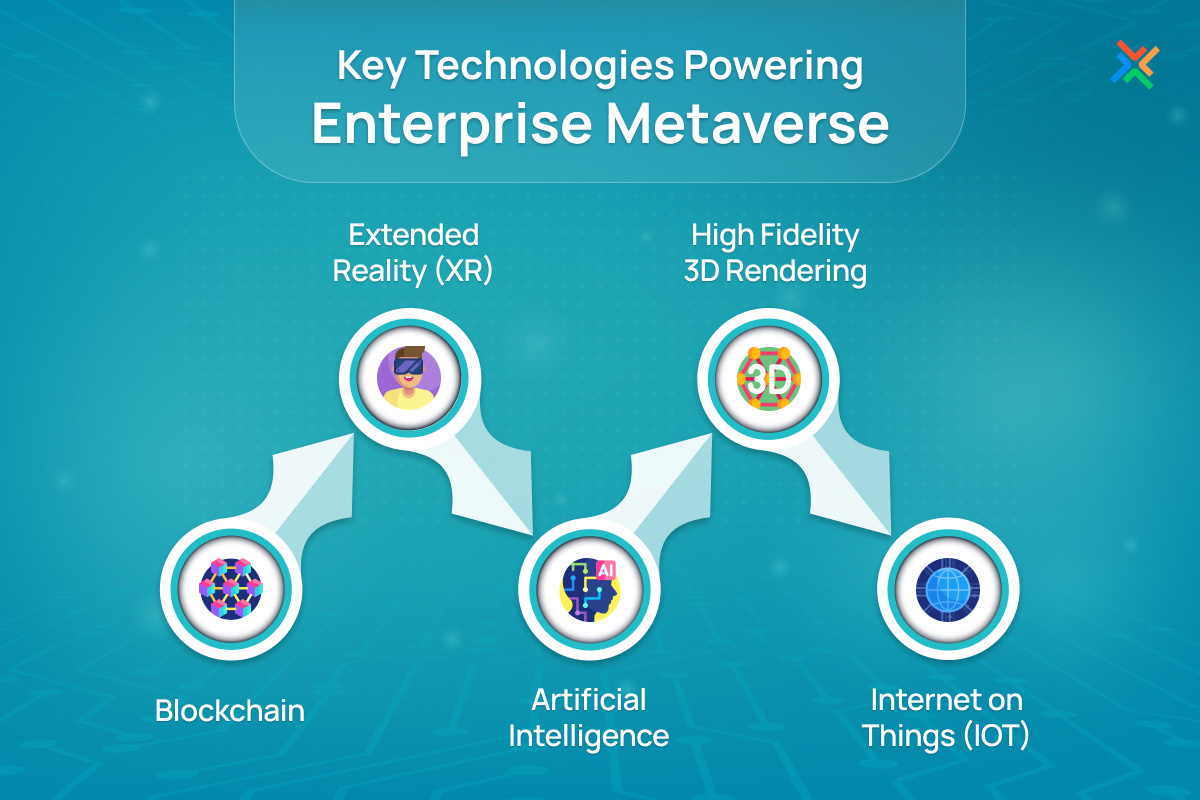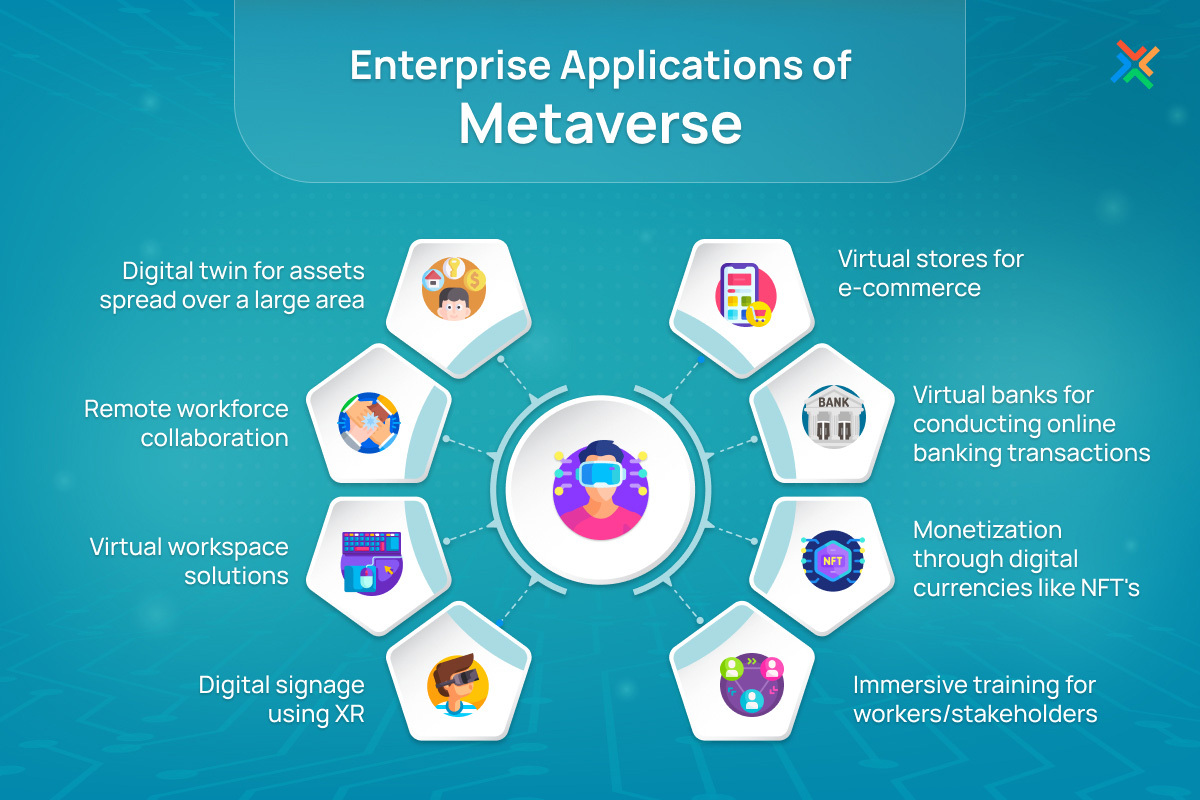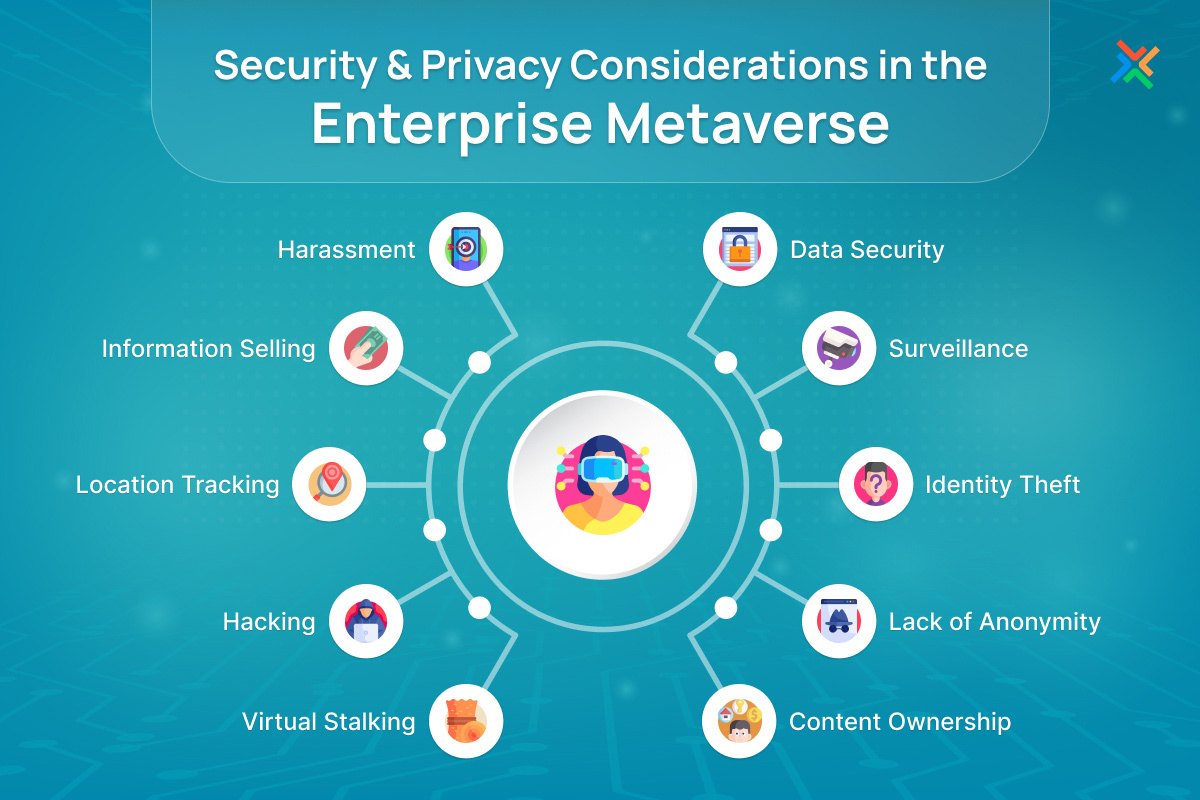Beyond Gaming: Exploring Enterprise Applications of the Metaverse in 2024
June 20, 2024

Ayush Kanodia
.jpg?w=1920&q=75)
The term "metaverse" has exploded in popularity, often intertwined with the world of video games and virtual avatars. But the metaverse is more than just a futuristic playground. It's a concept that's been brewing for decades, rooted in science fiction and envisioned as a persistent, interconnected network of 3D virtual worlds.
The metaverse, in simpler terms, can be described as an immersive digital environment where users can interact with each other and their surroundings in a way that goes beyond the limitations of the physical world. This concept relies heavily on a confluence of powerful technologies - Virtual Reality (VR) for complete immersion, Augmented Reality (AR) to overlay digital elements onto the real world, blockchain for secure data management, and Artificial Intelligence (AI) to power sophisticated interactions within the virtual space.
The year 2024 marks a pivotal moment for the metaverse development service in UAE. We're witnessing a rise in interest from leading companies across various industries. These companies are actively exploring how the metaverse can be harnessed to optimize operations, improve collaboration, and offer novel customer experiences. Investment in metaverse development is increasing, signifying a collective belief in its incredible potential.
What is Enterprise Metaverse?
The enterprise metaverse is not limited to mere entertainment. It's a dedicated virtual space designed specifically for businesses to conduct operations. Here, geographically dispersed teams can convene in real-time, collaborate on projects, and conduct virtual meetings within carefully designed environments.
Key Technologies Powering Enterprise Metaverse

Extended Reality (XR)
This umbrella term comprises VR (Virtual Reality), AR (Augmented Reality), and MR (Mixed Reality). VR headsets transport users entirely into a virtual environment, ideal for immersive design sessions or training simulations. AR overlays digital elements onto the physical world, perfect for remote maintenance tasks or virtual product demonstrations. MR blends both realities, offering a dynamic workspace where physical and digital objects interact.
Blockchain for Secure Transactions
Blockchain technology facilitates secure transactions, verifies ownership of virtual assets (like digital real estate), and optimizes data management within the metaverse. This promotes trust and the development of an optimal virtual marketplace.
High-Fidelity 3D Rendering
Creating a believable virtual world depends on high-quality 3D graphics. Powerful graphics processing units (GPUs) and advanced rendering techniques work together to generate realistic environments, avatars, and products. This level of detail is crucial for immersive experiences and effective collaboration within the metaverse.
Building a Cohesive Metaverse
Apart from these core technologies, there are several other advancements that are shaping the enterprise metaverse software development services.
Interoperability and Integration
Efficient movement between different metaverse platforms is vital. Technical innovations like open-source standards and interoperable protocols are making a unified metaverse experience possible. Platforms like Microsoft Mesh and NVIDIA's Omniverse are early examples supporting this vision.
AI-Powered Experiences
Artificial intelligence breathes life into the metaverse. AI-powered virtual assistants can guide users within the virtual world, answer questions, and automate tasks. Non-player characters (NPCs) powered by AI can create realistic interactions and improve training simulations. Furthermore, AI can personalize the metaverse experience, customizing content and recommendations for individual users.
Enterprise Applications of Metaverse
Enterprise metaverse does not just facilitate improved communication. It can entirely revolutionize how businesses operate across industries.

Product Design & Manufacturing
Metaverse helps you break down geographical barriers and enter a collaborative 3D design studio. Engineers scattered across the globe can work together in real time within these virtual spaces. Using high-fidelity 3D models, they can share ideas, provide instant feedback on intricate designs, and conduct virtual prototyping – all before a single physical component is manufactured. This leads to a dynamic and iterative design process. For instance, a team in California can sketch a new product concept while colleagues in Germany can refine its functionality in the same virtual environment. The metaverse facilitates rapid design iterations, reduces the need for physical prototypes, and accelerates innovation while minimizing costs.
Healthcare
Utilizing metaverse, surgeons can hone their skills in carefully crafted virtual operating rooms, replicating complex procedures with unparalleled realism. Instead of relying on static images or mannequins, surgeons can practice a delicate neurosurgical operation on a virtual patient countless times before performing it in the real world. This leads to higher surgical precision and improved patient outcomes. Furthermore, virtual avatars can bridge the gap in remote patient consultations, particularly for geographically underserved areas. Consider a scenario: a patient in a rural village connects with a specialist in a metropolitan city – virtually. This democratization of healthcare access can reinvent how we deliver medical services on a global scale.
Retail
The metaverse can eliminate the limitations of physical showrooms. Interactive virtual showrooms can offer personalized customer experiences. Customers can create personalized avatars that reflect their style and preferences. By remedying limited fitting rooms, virtual dressing rooms allow customers to experiment with different clothing combinations and receive real-time feedback from friends or a virtual stylist. This extends beyond apparel. Customers can virtually place furniture within a 3D replica of their home, ensuring a perfect fit before making a purchase. The metaverse even allows for immersive virtual tours of vineyards or farms, encouraging a deeper connection with the product's origin story. This personalized and interactive shopping experience leads to deeper customer engagement, boosts sales conversions, and builds brand loyalty.
Marketing & Sales
The metaverse provides a dynamic platform for hosting captivating virtual events. Businesses can unveil new car models in a virtual racetrack, allowing potential customers to experience the car's performance in a way a brochure simply can't convey. For example, a stunning virtual runway showcases a new fashion line, complete with interactive elements that allow viewers to zoom in on fabric textures or accessory details. The storytelling possibilities within the metaverse are limitless, allowing brands to create immersive experiences that resonate with target audiences and generate immense buzz. Furthermore, the metaverse eliminates geographical barriers. Businesses can connect with a global audience at virtual product launches and trade shows, maximizing reach and cultivating international partnerships.
Supply Chain Management and Logistics
Metaverse can help businesses gain real-time visibility into their entire supply chain through digital representations within the metaverse. They can track inventory movement, identify bottlenecks, and optimize logistics strategies in a visually intuitive way. Platforms like NVIDIA Omniverse and Azure Digital Twins empower businesses with a holistic view and increased control over their operations. For instance, a logistics manager monitoring a complex supply chain within a virtual environment can track shipments in real-time, identify potential delays, and adjust transportation routes – all within a single, immersive platform.
Urban Planning and Smart Cities
The metaverse can revolutionize how we design and develop our cities. Digital twins – virtual replicas of physical cities – can be used to test urban planning decisions before they're implemented in the real world. Architects and city planners can collaborate within a virtual replica of a city, testing the impact of new buildings or infrastructure projects on traffic flow, energy efficiency, and overall citizen well-being. This data-driven approach to urban planning can lead to the creation of more sustainable and livable cities.
Law and Legal Services
The metaverse can transform the legal landscape. Virtual courtrooms can facilitate remote legal proceedings, improving access to justice for geographically dispersed individuals. Lawyers can present arguments in a virtual courtroom, complete with avatars representing witnesses and judges. This technology can optimize legal processes, reduce costs, and improve the efficiency of the justice system.
Fitness and Wellness
Metaverse allows you to break free from the confines of traditional gyms and enter a world of personalized fitness experiences. Individuals can attend virtual fitness classes led by interactive instructors, complete with real-time feedback on their form and performance. The metaverse allows for personalized workout regimens tailored to individual fitness goals and limitations. Virtual environments can cater to a variety of preferences, from practicing yoga on a serene mountaintop to participating in a high-intensity workout in a futuristic fitness studio. Platforms like STRIVR and FitXR are at the forefront of this movement, offering immersive fitness experiences that cater to a wide audience.
Data Analytics and Insights
Just like the physical world, the enterprise metaverse generates a wealth of data. But unlike traditional data sets, metaverse data requires specialized analytics tools and approaches. This data can provide businesses with unique insights that would be impossible to glean from conventional sources.
Metaverse Data Analytics
Traditional analytics tools might struggle within the immersive environment of the metaverse. Specialized platforms are being developed by several reputable metaverse development companies in the UAE to capture and analyze data on user behavior, interactions, and preferences within these virtual spaces. Platforms like Oracle Cloud for Metaverse and Nvidia Omniverse Enterprise offer strong analytics suites that can help businesses gain a deeper understanding of how users navigate virtual environments, interact with objects, and respond to marketing campaigns.
Unique Data Insights
The metaverse provides a unique opportunity to gather data on user behavior in a controlled and measurable way. Businesses can track user interactions with virtual products, measure the effectiveness of training simulations, and analyze customer journeys within virtual showrooms. They can utilize this data in several ways.
- Personalize the User Experience: By understanding user preferences and behavior patterns within the metaverse, businesses can personalize virtual experiences to match individual needs and interests. This could involve customizing product recommendations in virtual stores or adjusting the difficulty level of training simulations.
- Optimize Virtual Workspaces: Data analytics can reveal how teams collaborate most effectively within virtual workspaces. Businesses can use this information to optimize the layout and functionality of these spaces, boosting team productivity and communication.
- Measure Marketing ROI: The metaverse allows businesses to track user engagement with virtual marketing campaigns in real-time. Data analytics can reveal which elements resonate most with target audiences, allowing for data-driven adjustments and a maximized return on investment.
- Improve Product Design: By analyzing user interactions with virtual prototypes, businesses can identify design flaws or areas for improvement before physical production begins. This data-driven approach can optimize the design process and lead to the creation of more user-friendly products.
Case Studies - Success Stories in 2024
Metaverse is already shaping businesses today. There are several compelling examples of companies in 2024 utilizing the metaverse to gain a competitive edge.
Boeing Takes Flight in Virtual Design
Global aerospace giant Boeing has revolutionized its design and training utilizing the metaverse. They've developed a collaborative 3D design studio within the metaverse, allowing engineers around the world to work together in real time on complex airplane models. This virtual environment optimizes communication, promotes faster design iterations, and reduces the need for expensive physical prototypes. Moreover, Boeing is utilizing the metaverse to create immersive training simulations for pilots. These simulations allow pilots to practice emergency procedures and tackle challenging scenarios in a safe and controlled virtual environment. This data-driven approach to training has demonstrably improved pilot proficiency and safety.
IKEA Furnishes the Future of Shopping
Furniture giant IKEA is reimagining the shopping experience with interactive virtual showrooms within the metaverse. Customers can create personalized avatars and explore virtual replicas of their homes. They can then experiment with different furniture arrangements, virtually test product sizes and styles, and even visualize how furniture pieces would look with their existing décor. This personalized and interactive experience removes the guesswork from furniture shopping, leading to increased customer satisfaction and higher conversion rates. IKEA has also reported a significant reduction in product returns due to customers' ability to ensure a perfect fit before purchasing.
Pfizer Immerses Medical Professionals in Training
The pharmaceutical giant Pfizer has adopted the metaverse to create immersive training simulations for medical professionals. Doctors can now hone their skills in carefully crafted virtual operating rooms, replicating complex surgical procedures with unmatched realism. This data-driven training environment allows surgeons to practice intricate techniques countless times before performing them on real patients, leading to higher surgical precision and improved patient outcomes. Pfizer's commitment to utilizing the metaverse benefits its own workforce as well as contributes to a more skilled and confident global medical community.
These are just a few examples of how forward-thinking companies are adopting the metaverse to gain a competitive advantage. From optimized design processes to improved training and interactive customer experiences, the potential applications are huge and constantly evolving.
Security & Privacy Considerations in the Enterprise Metaverse
As with any powerful technology, the enterprise metaverse also presents potential security and privacy concerns. Data breaches and unauthorized access to sensitive information within the virtual space are valid considerations. Just like in the real world, effective security measures are essential to maintain user trust and confidence.
Fortunately, there are solutions coming up to mitigate these risks. Implementing efficient user authentication protocols, employing strong data encryption techniques, and establishing clear regulations for data ownership within the metaverse are crucial steps. Standardized data privacy practices will be crucial, making sure users have control over their information and understand how it's being used.
At WDCS, we develop secure and responsible metaverse solutions. We prioritize user privacy and data security by adhering to the highest ethical standards. Our team is actively involved in shaping industry best practices and promoting a collaborative environment to address these concerns.

The Future of Work in the Metaverse
The enterprise metaverse is not just about replicating the physical workplace in a virtual space. It's about fundamentally transforming work cultures and employee experiences. Real-time data from wearables and biometric sensors integrated within the metaverse could personalize training programs and optimize workflows for peak individual and team performance.
The boundaries between the physical and virtual are further blurred with the onset of brain-computer interfaces (BCIs). These interfaces could allow users to interact with the metaverse through thought commands, offering an even more intuitive and immersive experience.
The metaverse offers a middle ground between traditional office work and remote work. Employees can switch between physical and virtual environments, attending meetings in person within the metaverse while still enjoying the flexibility of remote work.
As we stand at the precipice of this exciting new technology, the possibilities are limitless. Our team at WDCS Technology is at the forefront of developing innovative metaverse solutions. We can help you design, develop, and implement a customized metaverse experience that transforms your operations, empowers your workforce, and positions you for success. Contact us today and let's chart your course into the metaverse together.
Craft a customized metaverse solution for your business with WDCS Technology.
Metaverse is indeed the future of work. From collaborative 3D design studios to immersive training simulations, we, at WDCS, can help you transform how you work. Connect for collaboration.